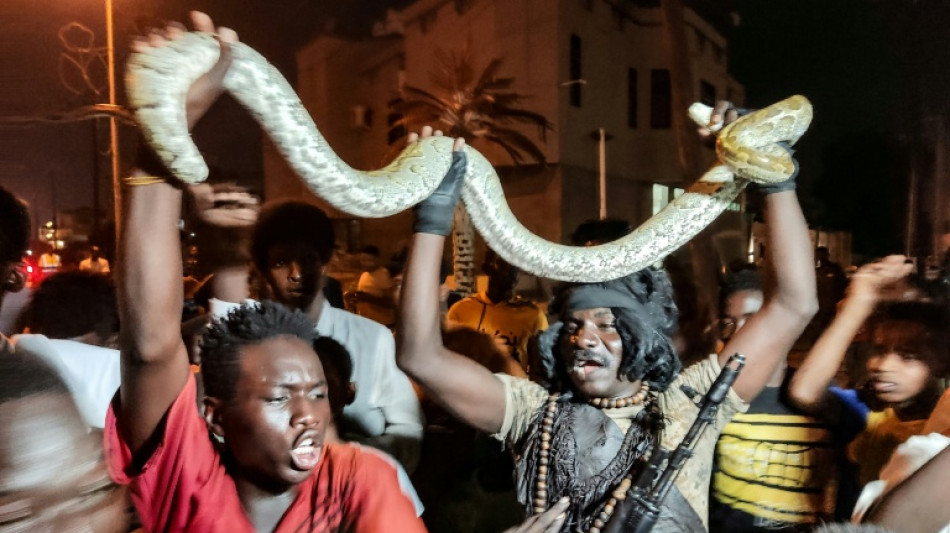
Sudan paramilitaries vow 'no surrender' after Khartoum reverses

Sudan's paramilitary Rapid Support Forces vowed on Thursday there would be "no retreat and no surrender" and said they had "repositioned" forces, after rival army troops recaptured nearly all of central Khartoum.
From inside the recaptured presidential palace, Sudan's army chief Abdel Fattah al-Burhan, at war with his former deputy, RSF commander Mohamed Hamdan Daglo since April 2023, had on Wednesday declared the capital "free" from the RSF.
But in its first direct comment since the army retook the capital's state institutions this week, the RSF said: "Our forces have not lost any battle, but have repositioned".
AFP could not independently confirm the paramilitary's remaining positions in the capital.
The war has killed tens of thousands of people, uprooted more than 12 million and created the world's largest hunger and displacement crises, according to the United Nations.
It has also split Africa's third-largest country in two, with the army holding the north and east while the RSF controls parts of the south and nearly all the vast region of Darfur, which borders Chad to the west.
The army on Wednesday had cleared Khartoum's airport of RSF fighters, an army source said, and encircled their last major stronghold in the Khartoum area, just south of the city centre.
The source told AFP that RSF fighters were fleeing from the military across the Jebel Awliya bridge, their only way out of the Khartoum area.
A successful retreat could link the paramilitary's Jebel Awliya troops to its positions west of the city and then to its strongholds in Darfur hundreds of kilometres (miles) away.
On Wednesday, hours after Burhan arrived in the presidential palace for the first time in two years, the RSF announced a "military alliance" with another rebel group, which controls much of South Kordofan state and parts of Blue Nile bordering Ethiopia.
The Sudan People's Liberation Movement-North, led by Abdelaziz al-Hilu, had clashed with both sides, before signing a political charter with the RSF last month to establish a parallel government in paramilitary territory.
- 'No desire' to govern -
Following a year and a half of defeats to the RSF, the army late last year began pushing through central Sudan to Khartoum.
Analysts have blamed the RSF's losses on strategic blunders, internal rifts and dwindling supplies.
Since it on Friday recaptured the presidential palace -- the heart of the capital's government and business district -- eyewitnesses and activists have reported RSF fighters retreating across the capital.
The army's gains have been met with celebrations from the de facto capital of Port Sudan, where displaced Sudanese rejoiced at the prospect of finally returning to Khartoum.
"God willing, we're going home, we'll finally celebrate Eid in our own homes," Khartoum native Motaz Essam told AFP, ululations and fireworks echoing around him.
Burhan, Sudan's de facto leader since he ousted civilian politicians from power in a 2021 coup, on Wednesday said the army was looking to form a technocratic government and had "no desire to engage in political work".
"The armed forces are working to create the conditions for an elected civilian government," Burhan said in a meeting with Germany's envoy to the Horn of Africa, Heiko Nitzschke, according to a statement from Burhan's office.
The RSF are descended from the janjaweed unleashed by strongman Omar al-Bashir more than two decades ago in Darfur.
Like the army, the RSF has sought to position itself as the guardian of Sudan's democratic uprising which ousted Bashir in 2019.
The United States has sanctioned both sides. It accused the army of attacks on civilians and said the RSF had "committed genocide."
Burhan and Daglo, in the fragile political transition that followed Bashir's overthrow, forged an alliance which saw both rise to prominence. Then a bitter power struggle over the potential integration of the RSF into the regular army erupted into all-out war.
F.Adams--TNT